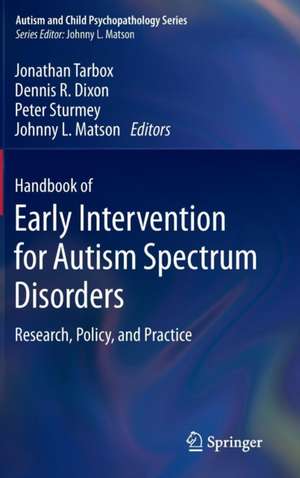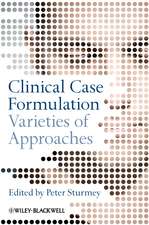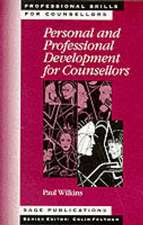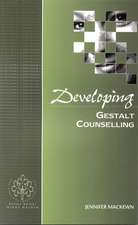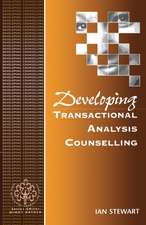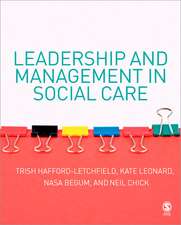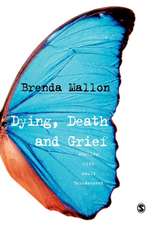Handbook of Early Intervention for Autism Spectrum Disorders: Research, Policy, and Practice: Autism and Child Psychopathology Series
Editat de Jonathan Tarbox, Dennis R. Dixon, Peter Sturmey, Johnny L. Matsonen Limba Engleză Hardback – 5 apr 2014
There are no easy answers, but the Handbook of Early Intervention for Autism Spectrum Disorders gives researchers, practitioners, and academics the science and guidance to better understand and intervene. Background chapters survey the history of professional understanding of the disorders and the ongoing debate over autism as a single entity or a continuum. Chapters on best methods in screening, assessment, and diagnosis reflect the transition between the DSM-V and older diagnostic criteria. And at the heart of the book, the intervention section ranges from evidence-based strategies for developing core skills to ethical concerns, cultural considerations, and controversial treatments.
Included in the Handbook's broad-based coverage:
- Designing curriculum programs for children with autism spectrum disorders (ASD).
- Mainstream education for children with ASD.
- Teaching independent living skills to children with ASD.
- Social skills and play.
- Behavioral and mental health disorders in children with ASD.
- Training and supporting caregivers in evidence-based practices.
- Teaching cognitive skills to children with ASD.
| Toate formatele și edițiile | Preț | Express |
|---|---|---|
| Paperback (1) | 2495.15 lei 6-8 săpt. | |
| Springer – 3 sep 2016 | 2495.15 lei 6-8 săpt. | |
| Hardback (1) | 2513.63 lei 6-8 săpt. | |
| Springer – 5 apr 2014 | 2513.63 lei 6-8 săpt. |
Din seria Autism and Child Psychopathology Series
- 18%
 Preț: 688.59 lei
Preț: 688.59 lei - 24%
 Preț: 1087.50 lei
Preț: 1087.50 lei - 18%
 Preț: 1129.20 lei
Preț: 1129.20 lei - 5%
 Preț: 2881.77 lei
Preț: 2881.77 lei - 20%
 Preț: 567.37 lei
Preț: 567.37 lei - 18%
 Preț: 1567.52 lei
Preț: 1567.52 lei - 15%
 Preț: 499.59 lei
Preț: 499.59 lei - 18%
 Preț: 954.77 lei
Preț: 954.77 lei - 18%
 Preț: 1672.16 lei
Preț: 1672.16 lei - 18%
 Preț: 1566.23 lei
Preț: 1566.23 lei - 15%
 Preț: 635.65 lei
Preț: 635.65 lei - 18%
 Preț: 2111.59 lei
Preț: 2111.59 lei - 18%
 Preț: 1669.79 lei
Preț: 1669.79 lei - 15%
 Preț: 644.30 lei
Preț: 644.30 lei - 15%
 Preț: 520.61 lei
Preț: 520.61 lei - 18%
 Preț: 1836.63 lei
Preț: 1836.63 lei - 18%
 Preț: 1565.61 lei
Preț: 1565.61 lei - 15%
 Preț: 645.28 lei
Preț: 645.28 lei - 15%
 Preț: 703.52 lei
Preț: 703.52 lei - 18%
 Preț: 727.80 lei
Preț: 727.80 lei - 24%
 Preț: 949.94 lei
Preț: 949.94 lei - 18%
 Preț: 1233.20 lei
Preț: 1233.20 lei - 15%
 Preț: 642.51 lei
Preț: 642.51 lei - 18%
 Preț: 1114.83 lei
Preț: 1114.83 lei - 18%
 Preț: 2984.58 lei
Preț: 2984.58 lei - 18%
 Preț: 1210.30 lei
Preț: 1210.30 lei - 24%
 Preț: 681.25 lei
Preț: 681.25 lei - 20%
 Preț: 585.05 lei
Preț: 585.05 lei - 18%
 Preț: 2531.30 lei
Preț: 2531.30 lei - 18%
 Preț: 1676.58 lei
Preț: 1676.58 lei
Preț: 2513.63 lei
Preț vechi: 3065.40 lei
-18% Nou
Puncte Express: 3770
Preț estimativ în valută:
480.97€ • 503.60$ • 398.94£
480.97€ • 503.60$ • 398.94£
Carte tipărită la comandă
Livrare economică 09-23 aprilie
Preluare comenzi: 021 569.72.76
Specificații
ISBN-13: 9781493904006
ISBN-10: 1493904000
Pagini: 860
Ilustrații: XXIII, 653 p. 25 illus.
Dimensiuni: 178 x 254 x 51 mm
Greutate: 1.69 kg
Ediția:2014
Editura: Springer
Colecția Springer
Seria Autism and Child Psychopathology Series
Locul publicării:New York, NY, United States
ISBN-10: 1493904000
Pagini: 860
Ilustrații: XXIII, 653 p. 25 illus.
Dimensiuni: 178 x 254 x 51 mm
Greutate: 1.69 kg
Ediția:2014
Editura: Springer
Colecția Springer
Seria Autism and Child Psychopathology Series
Locul publicării:New York, NY, United States
Public țintă
ResearchCuprins
Part 1: Diagnosis and Background.- 1. Evolution of Autism: From Kanner to the DSM-V.- 2. Autism Spectrum Disorders: Several Disorders on a Continuum or One?.- 3. Related Disorders.- 4. Assessment of the Core Features of ASD.- 5. Measures Used to Screen and Diagnose ASD in Young Children.- 6. Psychological Theories of Childhood Autism.- 7. Family Adaptation to a Diagnosis of Autism Spectrum Disorder.- Part 2: Intervention.- 8. Ethical Issues in Early Intervention.- 9. Economics of Autism Spectrum Disorders.- 10. Designing Curriculum Programs for Children with Autism.- 11. Reinforcement Arrangements for Learners with Autism Spectrum Disorder.- 12. Discrete Trial Teaching and Discrimination Training.- 13. Natural Environment Training.- 14. Picture Activity Schedules.- 15. Use of Visual Supports with Young Children with Autism Spectrum Disorders.- 16. Teaching Verbal Behavior to Children with Autism Spectrum Disorders.- 17. Social Skills and Play in Children with Autism.- 18. Teaching Cognitive Skills to Children with Autism.- 19. Teaching Independent Living Skills to Children with ASD.- 20. Developmental Approaches.- 21. Recovery and Prevention.- 22. Mainstream Education for Children with Autism Spectrum Disorders.- 23. Controversial Treatments for Autism Spectrum Disorders.- 24. Families of Children with Autism Spectrum Disorders.- 25. Management of General Medical Conditions.- 26. Behavioral Disorders in Young Children with Autism Spectrum Disorder.- 27. Mental Health Disorders in Young Children with Autism Spectrum Disorders.- 28. Training and Supporting Caregivers in Evidence-Based Practices.- 29. Multicultural and Minority Issues.
Notă biografică
Jonathan Tarbox, Ph.D., BCBA-D, is currently the Director of Research and Development at the Center for Autism and Related Disorders and the Executive Director of Autism Research Group, a non-profit organization dedicated to conducting research that makes a real difference in the lives of families living with autism. Dr. Tarbox’early career involved positions at both the New England Center for Children and the Kennedy Krieger Institute. Dr. Tarbox is a Board Certified Behavior Analyst-Doctoral, and he received his PhD in Behavior Analysis from the University of Nevada, Reno, under the mentorship of Dr. Linda J. Hayes. Throughout his career in behavior analysis, Dr. Tarbox has been actively engaged in basic, applied, and interdisciplinary research and has over 50 publications in peer-reviewed journals, book chapters in scientific texts, and articles in popular media. Dr. Tarbox currently serves on the board of editors for The Analysis of Verbal Behavior and Behavior Analysis in Practice, is a past member of the board of editors of the Journal of Applied Behavior Analysis and Research in Autism Spectrum Disorders, is a past member of the Governmental Affairs Committee of the Practice Board of the Association for Behavior Analysis International, , and a past President of the Nevada Association for Behavior Analysis. Dr. Tarbox’ research primarily focuses on treatments for establishing complex verbal, cognitive, and social skills.
Dennis R. Dixon, Ph.D., received his doctorate in Clinical Psychology from Louisiana State University with a focus in developmental disabilities. He completed a postdoctoral fellowship at the Johns Hopkins University School of Medicine and specialized in the treatment of severe challenging behaviors. The author of over 20 peer-reviewed articles and multiple book chapters, he currently serves on the editorial board of Research in Developmental Disabilities andResearch in Autism Spectrum Disorders. Dr. Dixon is the Chief Strategy Officer at the Center for Autism and Related Disorders. His research focuses on the integration of technology and big data to answer challenging questions related to autism spectrum disorders.
Peter Sturmey, Ph.D., received his doctorate in 1985 from the University of Liverpool, United Kingdom. He is Professor of Psychology at Queens College and the Graduate Center, City College of New York and a visiting professor at The Department of Dentistry, University College London. He has published 20 books, approximately 200 peer reviewed articles and 50 chapters. He is an Associate Editor for Research in Developmental Disabilities and Research in Autism Spectrum Disorders and a member of approximately 12 other editorial boards. He publishes widely on developmental disabilities such as autism, clinical case formulation, staff and parent training, restrictive behavioral interventions and behavior analytic approaches to psychopathology.
Johnny L .Matson, Ph.D., is Professor and Distinguished Research Master and Director of Clinical Training in the Department of Psychology at Louisiana State University, Baton Rouge, LA, U.S.A. He has also previously held a professorship in psychiatry and clinical psychology at the University of Pittsburgh. He is the author of more than 750 publications, including 38 books. He also serves as Founding Editor-in-Chief of three journals; Research in Developmental Disabilities (Elsevier), Research in Autism Spectrum Disorders (Elsevier), and Review Journal of Autism and Developmental Disorders (Springer).
Dennis R. Dixon, Ph.D., received his doctorate in Clinical Psychology from Louisiana State University with a focus in developmental disabilities. He completed a postdoctoral fellowship at the Johns Hopkins University School of Medicine and specialized in the treatment of severe challenging behaviors. The author of over 20 peer-reviewed articles and multiple book chapters, he currently serves on the editorial board of Research in Developmental Disabilities andResearch in Autism Spectrum Disorders. Dr. Dixon is the Chief Strategy Officer at the Center for Autism and Related Disorders. His research focuses on the integration of technology and big data to answer challenging questions related to autism spectrum disorders.
Peter Sturmey, Ph.D., received his doctorate in 1985 from the University of Liverpool, United Kingdom. He is Professor of Psychology at Queens College and the Graduate Center, City College of New York and a visiting professor at The Department of Dentistry, University College London. He has published 20 books, approximately 200 peer reviewed articles and 50 chapters. He is an Associate Editor for Research in Developmental Disabilities and Research in Autism Spectrum Disorders and a member of approximately 12 other editorial boards. He publishes widely on developmental disabilities such as autism, clinical case formulation, staff and parent training, restrictive behavioral interventions and behavior analytic approaches to psychopathology.
Johnny L .Matson, Ph.D., is Professor and Distinguished Research Master and Director of Clinical Training in the Department of Psychology at Louisiana State University, Baton Rouge, LA, U.S.A. He has also previously held a professorship in psychiatry and clinical psychology at the University of Pittsburgh. He is the author of more than 750 publications, including 38 books. He also serves as Founding Editor-in-Chief of three journals; Research in Developmental Disabilities (Elsevier), Research in Autism Spectrum Disorders (Elsevier), and Review Journal of Autism and Developmental Disorders (Springer).
Textul de pe ultima copertă
Current rates of autism diagnoses have been cause for concern and research as well as rumor and misinformation. Important questions surround the condition: how early can an accurate diagnosis be made? At what age should intervention start? How can parents recognize warning signs? And what causes autism in the first place?
There are no easy answers, but the Handbook of Early Intervention for Autism Spectrum Disorders gives researchers, practitioners, and academics the science and guidance to better understand and intervene. Background chapters survey the history of professional understanding of the disorders and the ongoing debate over autism as a single entity or a continuum. Chapters on best methods in screening, assessment, and diagnosis reflect the transition between the DSM-V and older diagnostic criteria. And at the heart of the book, the intervention section ranges from evidence-based strategies for developing core skills to ethical concerns, cultural considerations, and controversial treatments.
Included in the Handbook's broad-based coverage:
There are no easy answers, but the Handbook of Early Intervention for Autism Spectrum Disorders gives researchers, practitioners, and academics the science and guidance to better understand and intervene. Background chapters survey the history of professional understanding of the disorders and the ongoing debate over autism as a single entity or a continuum. Chapters on best methods in screening, assessment, and diagnosis reflect the transition between the DSM-V and older diagnostic criteria. And at the heart of the book, the intervention section ranges from evidence-based strategies for developing core skills to ethical concerns, cultural considerations, and controversial treatments.
Included in the Handbook's broad-based coverage:
- Designing curriculum programs for children with autism spectrum disorders (ASD).
- Mainstream education for children with ASD.
- Teaching independent living skills to children with ASD.
- Social skills and play.
- Behavioral and mental health disorders in children with ASD.
- Training and supporting caregivers in evidence-based practices.
- Teaching cognitive skills to children with ASD.
Caracteristici
Offers comprehensive, evidence-based research on early intensive behavioral intervention for autism Explores the evolution of ASD, from Kanner and Asperger through the various DSM editions Reviews the neurobiology of ASD, including its implications for screening and treatment Examines the EIBI methods for screening, diagnosing, and treating autism spectrum disorders Points the way forward for future research and practice Includes supplementary material: sn.pub/extras
